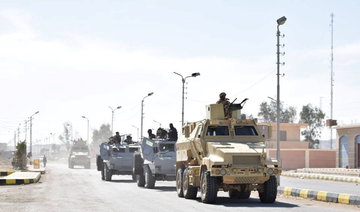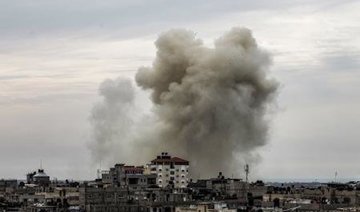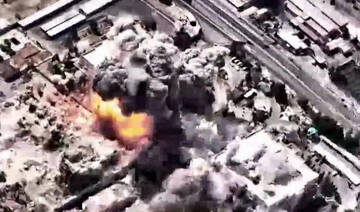CAIRO: Egypt’s military said Sunday 16 militants, an officer and a soldier were killed in the past four days during a major military operation against Daesh militants in Sinai.
The army launched a sweeping campaign after Egyptian President Abdel Fattah El-Sisi, who is standing in elections for his second term this month, gave them a three-month deadline to crush Daesh in Sinai.
He issued his ultimatum in November after suspected Daesh gunmen massacred more than 300 worshippers in a Sinai mosque associated with Sufi Muslim mystics.
Since the military, then led by El-Sisi, ousted President Muhammad Mursi in 2013, security forces have sought to quell attacks by the Egypt branch of Daesh.
The militants have killed hundreds of soldiers, policemen and civilians, mainly in North Sinai but also elsewhere in Egypt.
They have also killed scores of Christians in church bombings and shootings, as well as bombing a Russian airliner carrying tourists from an Egyptian resort in 2015, killing all 224 people on board.
The military says it has evidence Daesh has sought to move members to Sinai following its defeats in Iraq and Syria.
On Saturday, an Egyptian court sentenced 10 people to death and five others to life in prison for forming a “terrorist cell” to plot attacks on security forces and other institutions.
The state-run MENA news agency said the defendants are affiliated with the now-outlawed Muslim Brotherhood group and are accused of aiming to assault security personnel and state institutions, target Egypt’s Christians and disrupt public order.
The verdict comes after consultation with the Grand Mufti, Egypt’s top religious authority, over preliminary death sentences handed to the defendants earlier. The consultation is a formality followed by courts in the cases of capital punishment.
MENA said three of the 15 defendants were sentenced in absentia. Life sentences in Egypt are equal to 25 years. All of the sentences are subject to appeal.
16 militants killed in Sinai operation, says Egypt’s army
16 militants killed in Sinai operation, says Egypt’s army

Israel says carrying out ‘large-scale strikes’ on Tehran

JERUSALEM: The Israeli military said it launched “large-scale strikes” on Tehran on Monday, two days since the start of a US-Israeli campaign against Iran.
“The Israeli Air Force... has begun an additional wave of strikes against the Iranian terror regime at the heart of Tehran,” the military said in a statement.
Israei's new “large-scale” strikes followed mile fire from Iran that injured three people in Jerusalem late on Sunday.
“A direct impact of a munition was identified on one of the main roads in Jerusalem,” police said in a statement, sharing footage showing officers at a highway section littered with rubble.
Israel’s emergency medical service Magen David Adom said three people were injured, including a 46-year-old man with moderate shrapnel wounds.
The medical organization earlier said several others were treated for light injuries at the site.
AFP journalists heard a series of loud blasts above the city, after the Israeli military said it had detected missiles launched from Iran.
Israel’s Kan public television and Channel 12 broadcast footage showing police officers and rescuers deployed in areas where visible damage could be seen, one “in the center of the country” and the other in the Jerusalem area.
In the Jerusalem area, the footage showed a road strewn with debris and rocks.
In the center of the country, damaged cars could be seen.
Military censorship prohibits the media from disclosing the exact locations of the impact sites.
In other developments:
• The European Union has warned of the cost to the Middle East of a long war, and said it was reinforcing its naval mission in the Red Sea with additional vessels as Iran’s retaliation to US-Israeli strikes threatens maritime traffic, a European diplomat said.
Two new French ships will join the EU’s Aspides mission, bringing to five the number of warships taking part, the diplomat told AFP.
• Gulf states vowed to defend themselves against Iranian attacks, including by “responding to the aggression” if need be, after the Gulf Cooperation Council convened via video-link to formulate a unified response.
• Top US officials including Secretary of State Marco Rubio will make the case Tuesday to Congress for the attack on Iran. Rubio, Defense Secretary Pete Hegseth, CIA Director John Ratcliffe and military chief General Dan Caine “will brief the full membership of both chambers of Congress,” White House spokesman Dylan Johnson said.
• Container shipping company Maersk said it was halting passage through the Suez Canal and the Strait of Hormuz for “safety” reasons.
The Danish group was the latest of several shipping groups to make similar announcements after Iran’s Revolutionary Guards declared the strait closed on Saturday.
• Seven people were injured in the Jerusalem area following the latest salvo of missiles fired from Iran, Israeli firefighters said.
• British Prime Minister Keir Starmer said he had agreed to let the United States use UK bases to fire “defensive” strikes aimed at destroying Iranian missiles and their launchers. But in a video address posted to social media, he added: “We were not involved in the initial strikes on Iran and we will not join offensive action now.
• Iranian media reported that a police station in a city on the outskirts of Tehran had been hit, killing an unspecified number of people, with others reportedly trapped under debris. “According to initial reports, a number of citizens were martyred and some were trapped under the rubble,” the Tasnim news agency reported.
• Iranian news agency ISNA reported that Gandhi hospital in northern Tehran had been targeted by strikes. The Fars and Mizan agencies published a video, presented as being from inside the facility, showing debris on the floor among wheelchairs.














